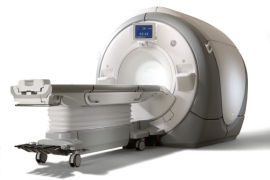MISSION-Fumarate: A physiological study of the metabolism of fumarate in cancer using hyperpolarised 13C magnetic resonance imaging

What is the purpose of this study?
We are exploring whether we can detect dying cancer cells by using a new imaging technique called ‘Hyperpolarised Magnetic Resonance Imaging (MRI)’. We will analyse patient imaging and then compare these to tissue samples from biopsies collected from a patient’s tumour to evaluate how accurate this new test is at detecting cell death.
We also want to investigate if this new technique can be used to predict who will have a more effective response to treatment in the longer term, and if this can be achieved at a very early time point during treatment. We hope that the results of this study will help us to design new and better ways to image patients with cancer and individualise treatment options.
Why is this research being done?
An MRI scanner can image many properties of tumours, but many of these take time to change after starting drug treatment. This new technique provides information about cancer metabolism which may change earlier than many of the changes that can be detected with conventional MRI.
We are working on ways to do this by imaging a hyperpolarised molecule called fumarate: hyperpolarised molecules are not radioactive, but have greatly increased signal above natural levels, so the MRI scanner is better able to identify them in the body. Fumarate is converted into another molecule in the presence of dead cells called malate, and we hope to use the presence of malate to identify this dead tissue.
What are the benefits of taking part in the study?
We hope that this study will help develop new ways of imaging tumours and how they respond to treatment, without patients having to have invasive procedures such as biopsies. This could also help to predict which patients will respond to individual treatments with more accuracy. This information may help doctors to better select treatment and provide a patient with the best opportunity for a positive health outcome.
Who is being included in the study?
We are planning to enrol up to 70 patients diagnosed with cancerous tumours or masses from the Cambridge University Hospitals (CUH) NHS Foundation Trust. We are also enrolling up to 20 healthy volunteers to develop the test and to better understand the results from patients.
What is the status of the study?
The MISSION-Fumarate study is currently open for recruiting patients.
Who is carrying out the study?
The study is being conducted by the Department of Radiology, University of Cambridge and Cambridge University Hospitals NHS Foundation Trust. The study is being funded by Cancer Research UK (CRUK), The Mark Foundation, and the National Cancer Imaging and Translational Accelerator (NCITA).
If I have any questions, who can I contact?
If you have any questions, you can contact us by email at cuh.radiologyresearch@nhs.net
For more information, see the MISSION-Fumarate study record ISRCTN49119680: https://www.isrctn.com/ISRCTN49119680

